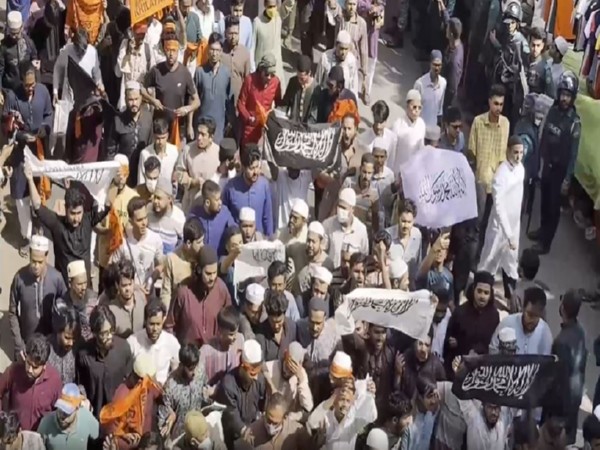Dhaka [Bangladesh], April 1 (ANI): After the ouster of Bangladesh Prime Minister Sheikh Hasina, religious fundamentalists in one town announced that young women could not play soccer anymore. In another town, they forced the police to release a man who had harassed a woman for not covering her hair in public and then draped him in garlands of flowers, The New York Times said.
Following this, demonstrators held a rally in Dhaka and warned that if the government did not give the death penalty to anyone who disrespected Islam, they would conduct executions with their own hands. After a few days, an outlawed group held a march, calling for an Islamic caliphate, as per a report in the US publication.
Earlier in March, Hizb ut-Tahrir, a radical Islamist organisation banned in Bangladesh since October 2009, carried out its first open rally in Dhaka. Joined by thousands of its members, the group began the rally from the north gate of Baitul Mukarram National Mosque after Friday prayers. The rally was titled “March for Khilafah.”
According to critics, Bangladesh’s interim government led by Chief Advisor Muhammad Yunus has not taken a hard enough approach against extremist forces, The New York Times reported. The critics have accused Yunus of being soft, lost in the weeds of democratic reforms, conflict-averse and not able to articulate a clear vision as extremists take up more public space, The New York Times said in an opinion piece.
As Bangladesh attempts to rebuild its democracy and chart a new future for its 175 million people, a streak of Islamist extremism that had long existed beneath the country’s secular facade has now emerged, the US daily said.
Representatives of several Islamic parties and organisations in interviews, some of which had previously been barred, have said that they were working to push Bangladesh in a more fundamentalist direction.
The Islamist leaders have stressed that Bangladesh should erect an “Islamic government” that punishes the people who disrespect Islamic values and enforces “modesty.” Officials in the political spectrum who are drafting a new constitution have said that the document was likely to not include secularism as a defining characteristic of Bangladesh, replacing it with pluralism and shifting the nation along more religious lines.
Female students who helped oust Sheikh Hasina are particularly distressed with the fundamentalist turn, as they had hoped to replace one-party rule with a democratic openness that accommodates the country’s diversity. However, they now find themselves competing against religious populism that leaves women and religious minorities, including Hindus and adherents of small sects of Islam, especially vulnerable.
Sheikh Tasnim Afroz Emi (29), a sociology graduate from Dhaka University, said, “We were at the forefront of the protests. We protected our brothers on the street.” She further said, “Now after five, six months, the whole thing turned around.”
Bangladesh’s police, which largely deserted following Hasina’s ouster, remain demoralized and can no longer hold the line. The military, which has been taking some policing duties, is at odds with the Yunus-led government and the student movement, which wants to hold officers accountable for past atrocities.
Nahid Islam, a student leader who was a minister in Bangladesh’s interim administration before resigning recently to lead a new political party, said “the fear is there” that Bangladesh will slip towards extremism. He expressed hope that despite changes in the constitution, values like democracy, cultural diversity and an aversion to religious extremism can hold. He said, “I don’t think a state can be built in Bangladesh that goes against those fundamental values.”
Recently, a group of organisers in Taraganj town decided to hold a soccer match between two teams of young women, aimed to provide entertainment and inspire local girls. However, as the preparations were being made for the match, a town mosque leader, Ashraf Ali, declared that women and girls should not be permitted to play soccer.
Usually, sports organisers in Bangladesh publicly announce details regarding the match by sending loudspeakers tied to rickshaws around town. However, this time, Ali matched them by sending his speakers and warning people not to attend the game.
When the players were changing into their jerseys in the classrooms turned into dressing rooms on February 6, local officials were holding a meeting regarding the game. Sirajul Islam, one of the organisers, said that Ali announced that he “would rather become a martyr than allow the match.” The local administration then announced the game’s cancellation and placed a curfew in the area.
Taslima Akhtar (22), who had travelled four hours to play in the match, said she had seen “a lot of cars, army and police,” who told the players that the match was off. She further said that she has been playing soccer for the past 10 years but she has faced such opposition for the first time.
A couple of weeks later, the organisers conducted a women’s match in the presence of security forces. However, organisers asked the young women to wear stockings under their shorts.
A mob attacked the Ahmadiyya’s place of worship on the night that Hasina’s government collapsed, part of a national wave that targeted religious sites of minority communities, especially those of Hindus. People of the Ahmadiyya community have been living in fear, and the attendance at their prayer hall has reduced by nearly half. They are not permitted to rebuild the hall’s destroyed sign or to broadcast their call to prayer from loudspeakers.
Earlier in March, the Bangladesh Hindu Buddhist Christian Unity Council, the largest minority group in Bangladesh, claimed that violence against religious and ethnic minorities, as well as indigenous peoples, continues unabated. The group issued a press release stating that 92 incidents of violence targeting minorities and indigenous peoples occurred in the first two months of this year, January and February.
The minority group reported that out of the 92 violent incidents, there were 11 murders, three rapes, 25 attacks on temples, one incident of religious insult, six attacks on indigenous people, 38 attacks, vandalism, and looting of homes and businesses, two dismissals from jobs, and six other attacks. (ANI)
Disclaimer: This story is auto-generated from a syndicated feed of ANI; only the image & headline may have been reworked by News Services Division of World News Network Inc Ltd and Palghar News and Pune News and World News
HINDI, MARATHI, GUJARATI, TAMIL, TELUGU, BENGALI, KANNADA, ORIYA, PUNJABI, URDU, MALAYALAM
For more details and packages











